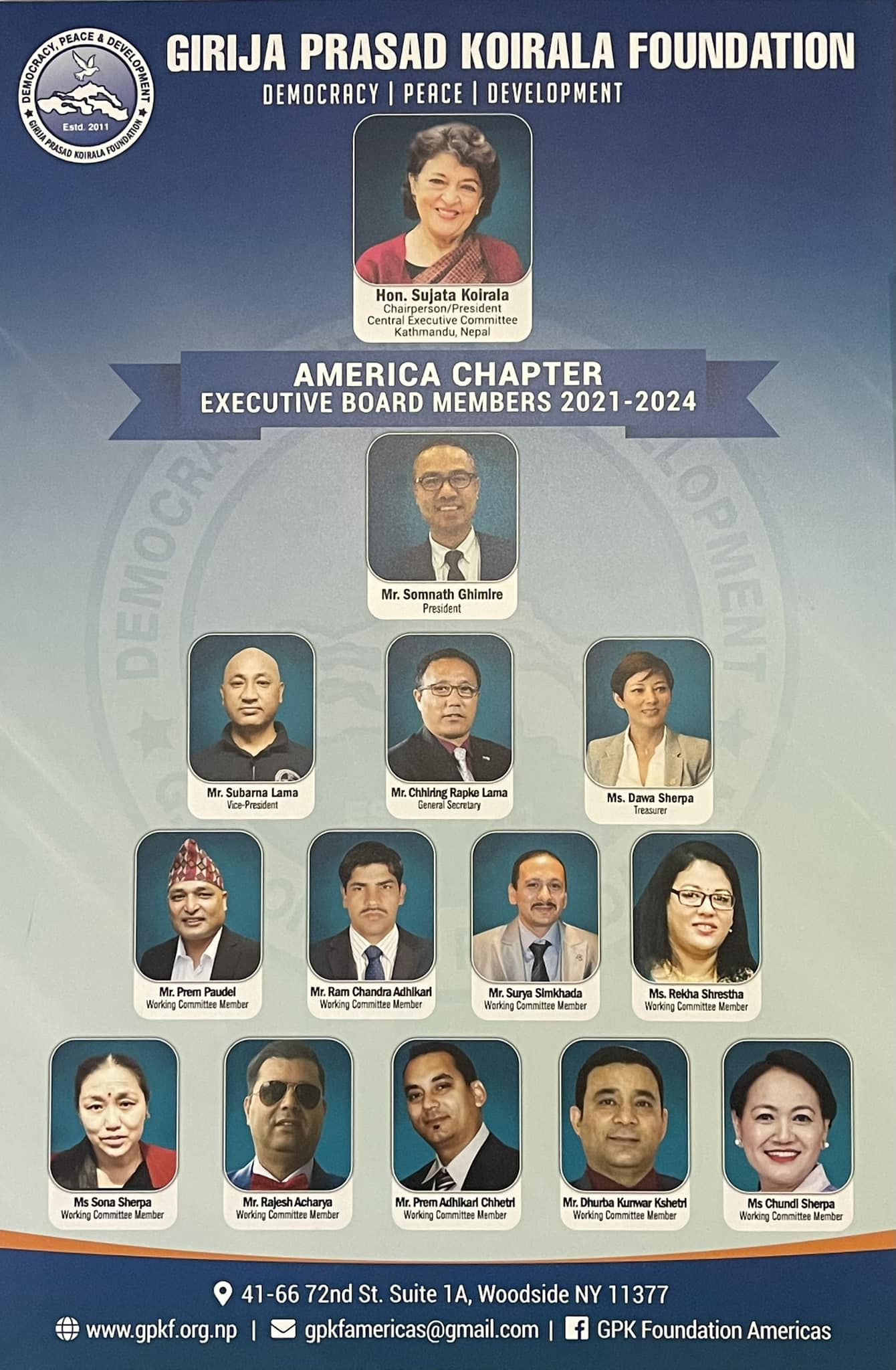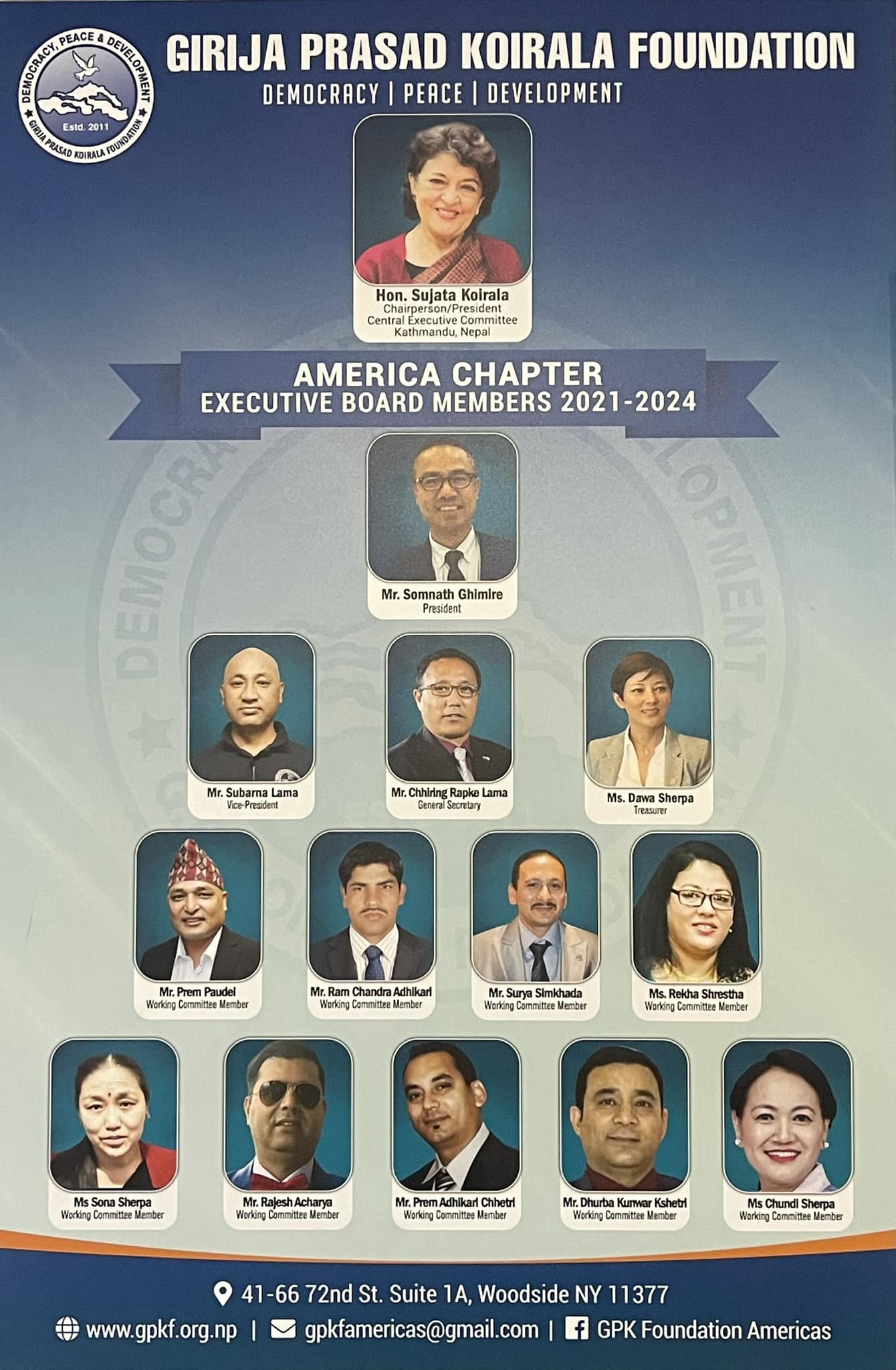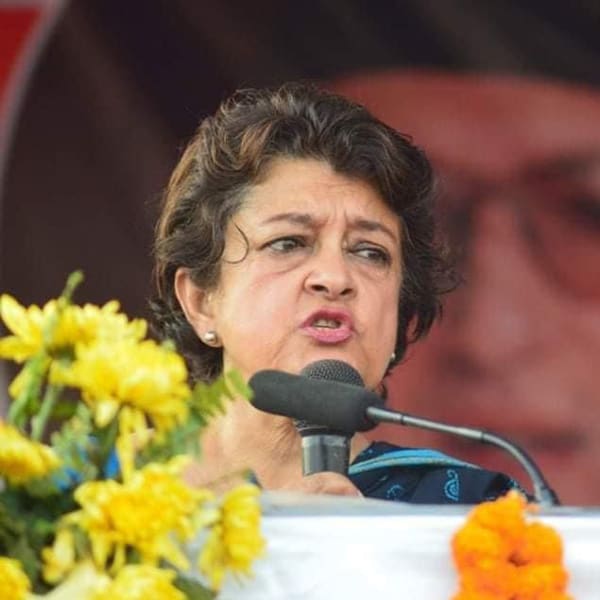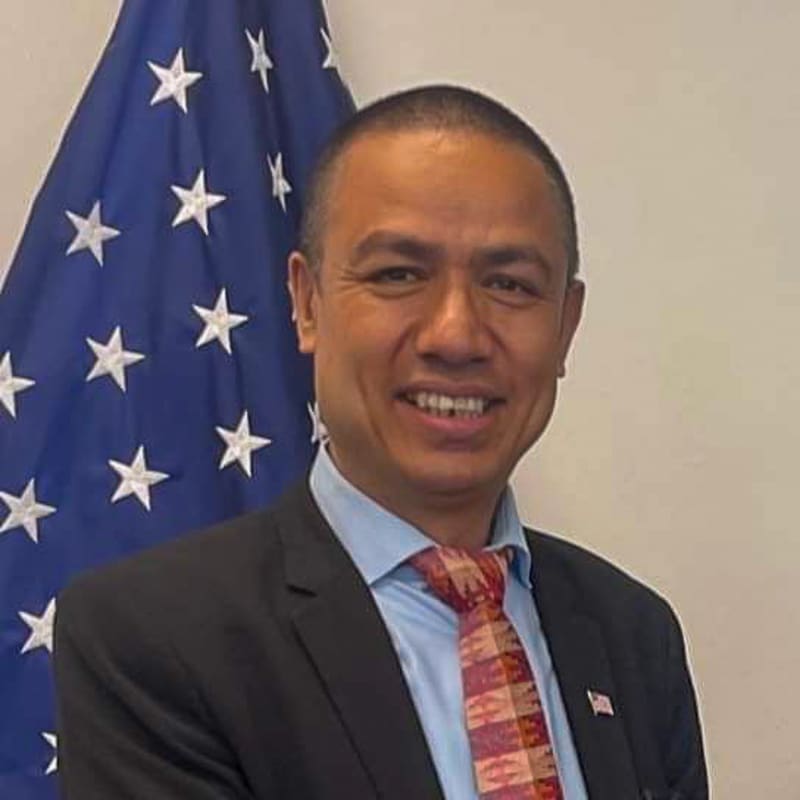About Us

About the Organization

Family Background
Three sons of Krishna Prasad Koirala have become Prime Ministers of Nepal. Besides GP Koirala, Matrika Prasad Koirala and BP Koirala, became Prime Minister in 1951 and 1959 respectively. BP Koirala was the first elected Prime Minister of Nepal during 1959-1960 periods. Following successful people’s democratic movement in 1990, Nepal held parliamentary elections under democratic dispensation in 1991. As his Nepali Congress party secured comfortable majority in the House of Representatives, GP Koirala became the second elected Prime Minister in the political history of Nepal. He also took over as Minister for Foreign Affairs with a view to giving new dynamism to Nepal’s international relations in the changed context. It is he who added transnational issues and economic diplomacy as integral elements in Nepal’s foreign policy. He also served as Prime Minister in different times in 1998-1999, 2000-2001, and defining periods of 2006-2008.
GP Koirala’s Struggle for Democracy
Involvement in NC
Nepali Congress Party was founded in 1946 and GP Koirala’s involvement was precious ever since the formation of Nepali Congress. Nepali Congress, a pioneer democratic force- which is also an active member of the Socialist International (SI), London, firmly believes in liberal democratic ideals and has continuously been working for political pluralism, human rights and social justice to the people. It subsequently led three revolutions in 1950, 1990 and 2006 in Nepal. In all these historic movements, GP Koirala’s contribution always remained vital and prominent. In 1951, GP Koirala became the President of the Morang district chapter of the Nepali Congress and in 1959; he was elected as a member of the Central Executive Committee of Nepali Congress Party. Later in 1976, he became the Secretary General of the party and since 1996 has been leading the Nepali Congress as its elected President to date.
Labor Movement
Starting his political career as labor leader in 1947, he led the first Nepal’s workers’ movement to demand fundamental rights for the laborers in a jute mill at his home district. The intolerant Rana autocracy incarcerated him for three years in 1947 for his righteous deed. He founded the Nepal Mazdoor (labour) Congress, later re-christened as the Nepal Trade Union Congress – a union affiliated with the International Trade Union Confederation (ITUC), Brussels.
End of Rana Autocracy, 1950-51
He actively participated in the democratic revolution that ended 104 years old autocratic Rana regime. The revolution was the first mass movement for democracy and freedom from autocracy launched by the people in the annals of political history of Nepal. Its basic purpose was to guarantee the fundamental rights of the people and run the country under a democratic constitution drafted by the Constituent Assembly elected by the people.
First Elected Government and Royal Coup
After considerable delay, the Constitution came into being in 1959 but in 1960, Nepal faced political turmoil as the King seemed to run the country through peremptory command. Intolerant to the programmes of sweeping social and economic reforms and progressive agenda of the government , the King staged a coup against the parliamentary democracy on 15th of December, 1960, scrapped the Constitution of Nepal and imprisoned elected Prime Minster BP Koirala, his cabinet colleagues and senior leaders of other political parties. Political parties were banned for good and a system was imposed to perpetuate the direct rule of the King.
As a vociferous opponent of the King’s unconstitutional takeover, GP Koirala was put behind bars for seven consecutive years. He was freed only in 1967. After his release, GP Koirala, along with other leaders of the party, went into forced exile to India from where he relentlessly continued his political movement for the restoration of democracy in Nepal.
GP Koirala and Referendum, 1980
BP Koirala’s return to Nepal on 30 December 1976 with a political slogan of National Unity and Reconciliation galvanized and enthused the pro-democracy forces and played a catalytic role for the nationwide movement of students in 1979. The King declared a referendum in May 1980 to make a decision to continue existing King’s Panchayat system or go for a multiparty democracy. GP Koirala’s active involvement in referendum was unprecedented and remarkable, in favor of multiparty system of democracy.
Civil Disobedience Movement, 1985
As the results of the referendum were manipulated in favour of the Panchayat system, the Nepali Congress did not participate in the general elections as the system did not provide a congenial space for popular participation in the absence of political freedom. The NC continued its peaceful struggle against the despotic royal rule. In 1985, it launched Civil Disobedient Movement (Satyagraha) throughout the country with an objective to restore multiparty democracy. GP Koirala led the Movement against the existing party-less order with full courage and commitment.
Movement of 1990 and Restoration of Multi-party Democracy
When the wind of change for democratic governance was blowing worldwide, Nepal’s banned political parties, under the leadership of NC, launched a peaceful stir for the establishment of democracy in Nepal. The movement created adequate pressure to the autocratic King to restore multiparty democracy in Nepal in 1990. GP Koirala was one of the front-line leaders of the Movement and had actively taken part in the negotiation with the King who ultimately agreed to vest sovereignty of the nation in the hands of the people. It was the beginning of the Constitutional Monarchy in Nepal.
Koirala as Prime Minister of Nepal
With the advent of multiparty democracy and the promulgation of 1990 Constitution, parliamentary elections were held. As his party got majority of seats, GP Koirala was appointed as the Prime Minister of Nepal in May 1991. The government led by GP Koirala focused on unleashing entrepreneurship and community led initiatives for income generation, rural development, poverty alleviation and social advancement. The government liberalized Nepalese economy, spearheaded mass social mobilization giving greater importance to the empowerment of the marginalized groups, backward communities and minorities living in rural areas. With swift and far-reaching economic reform, the country achieved reasonable economic and social progress improving the quality of lives of the people. The country cherished the significance of democratic governance including the promotion of media freedom and the creation of new opportunities and space for every segment of the society.
As Koirala and successive governments put greater emphasis on the social development, this period witnessed a massive infrastructure development in the country as well as strengthening of democratic institutions, building foundation for local self-governance, and the empowerment of people in general and marginalized and disadvantaged communities in particular.
Nepal’s Peace Process and GP Koirala
In 1996, the Communist Party of Nepal (Maoist) launched an armed insurrection in order to establish a communist rule. In its 10 years armed revolt, more than 13,000 innocent people lost their valuable lives, hundreds of thousand people and families were internally displaced and billions of dollars worth infrastructures were damaged. As a leader of the nation, Koirala said that he “had two options: be a mute spectator of the bloodshed in the country or take initiatives to end the conflict and bring Maoists in democratic political mainstream (14th SAARC summit).” A firm believer in political pragmatism, Koirala initiated a dialogue with underground Maoists and skillfully engaged them through 12 point agreement heralding a new phase of greater democratic alliance in Nepal’s recent political history.
Taking into account Koirala’s uncompromising stand, the politically ambitious King was forced to restore the prematurely dissolved parliament in 2006. GP Koirala became a consensus Prime Minister of Nepal as he was supported by all political parties participating in the movement. GP Koirala led the Seven Party Alliance (SPA) government and held various rounds of dialogue with the Maoists. He showed his tactful acumen during his negotiations with Maoists. The negotiation resulted in an agreement between government and Maoists to invite the United Nations to help in Nepal’s peace process. He was the moving spirit behind the conclusion of the historic Comprehensive Peace Agreement (CPA) with the Maoists, which formalized the end of the decade-long armed conflict in society. As Prime Minister, GP Koirala successfully persuaded major political parties of the nation to induct Maoists in the Parliament in order to transform them to parliamentary politics. This encouraged the Maoists joining the interim government. After the Maoists decided to suddenly quit the government, Koirala motivated them to rejoin the coalition government. It was a landmark political development to mainstreaming Maoists through peaceful means generating a greater level of confidence among the people.
Transition from Monarchy to Republicanism
Following the promulgation of the Interim Constitution, Koirala, as the Prime Minister, also discharged the duties as interim Head of State. The Nepal army which had traditionally been so loyal to the monarchy reposed its faith in GP Koirala’s political acumen and leadership. The Maoists too were assured by Koirala’s statesmanship and positive role. The chairman of Maoists Mr. Prachanda, in an interview, reposed full faith in Koirala’s undisputed and visionary stewardship and said, “If the leadership of Koirala is changed at this period, the process (of transition) could be sabotaged.” It was, indeed, the beginning of the end of the Monarchy through peaceful transformation. Following the April 2008 Constituent Assembly elections, the first meeting of the Constituent Assembly voted to declare Nepal a Republic on 28 May 2008. Koirala, speaking to the Constituent Assembly shortly before the vote, said, “We have a big responsibility now”; he said that Nepal was entering a “new era” and that “the nation’s dream has come true”. In the consecutive political development, the Constituent Assembly elected the first President of Nepal on July 23, 2008.
GP Koirala is a lofty democratic figure of Nepal combined with statesmanship, experience, flexibility and pragmatism. In spite of his physical limitations owing to his age and ailment, he is making efforts to give a final push to the ongoing peace process, which is on the verge of conclusion. He is working for the rehabilitation and re-integration of Maoists combatants into society as early as possible. He has continued to be the most relevant political figure in the country. This is amply demonstrated by the constitution of the High Level Political Mechanism which was also encouraged by the Security Council of the United Nations, under his leadership. The High-level Mechanism has been established on 8 January 2010, involving top leaders of the three mainstream political parties, with a view to institutionalizing peace and stability in the country through timely promulgation of the new constitution. His ultimate wish is to make Nepal an indivisible, progressive, and economically prosperous country wedded to the principles of political pluralism, human rights, rule of law and civil liberties.
To conclude with, GP Koirala with a long and vibrant political career has been recognized as an ardent champion of pluralist democracy, a strong advocate of human rights and a constant defender of civil liberties not only at home but also in the region. His pioneering role in political negotiations as demonstrated by his policy of skillful persuasion has helped in transforming an armed Maoist party to join democratic political mainstream heralding the onset of peace process in the country.
 Hon. Sujata KoiralaFounder President of the GPKF and SKMT
Hon. Sujata KoiralaFounder President of the GPKF and SKMT Hon. Sujata Koirala
Hon. Sujata Koirala is an active politician and was continuously Member of Parliament for two terms, the House of Representative, of Nepal. Born into the Koirala family of Nepal in 1954, she was involved in politics from an early stage of her life with personal commitment to the service of the people. As the daughter and close political associate of Girija Prasad Koirala, the legendary political leader of Nepal who devoted his life for democracy, freedom, peace and development, Sujata Koirala remained extensively involved in the struggle for restoration of democracy and people's rights. Determined to pursue the vision of ensuring lasting peace and democratic governance in the country, she remains active in Nepalese politics for consensus, cooperation and unity among the Nepalese people and political parties.
In her political career, she has assumed a number of responsibilities as member of the Cabinet in the Government of Nepal as well as in her Political Party the Nepali Congress, which is the torchbearer of the democratic awakening in Nepal. She was Deputy Prime Minister and Minister for Foreign Affairs from 2009-2011. She is a Central Working Committee Member of the Nepali Congress Party.
Sujata Koirala is also serving as the Standing Committee Member of the International Conference for Asian Political Parties (ICAPP), Co-Chairperson ICAPP Women’s Wing, Co-Chairperson of ICAPP Asian Cultural Council (ACC).
In addition to her political career, Sujata Koirala is actively involved in social works and philanthropic activities. She is the Founder President of the GP Koirala Foundation for Democracy, Peace and Development (GPKF) and of the Sushma Koirala Memorial Trust (SKMT).

Somnath Ghimire, President of GPKF America
Somnath Ghimire, also known as "Sam," is a prominent Nepali American community leader and a Community Activist who has achieved several significant milestones. He is the first Nepali American to receive the Humanitarian Award Global 2023 in Accra, Ghana, and the South Asian Activist of the Year 2023 by the oldest South Asian Democratic Club. Additionally, he became the first unopposed Nepali American Judicial Delegate elected to the NYS 11th Judicial District Democratic Party and the first to receive the AAPI Distinguished Leadership Award 2024. Mr. Ghimire is actively involved in various leadership roles, including as a member of NYC Community Board #2, an Honorary Member of NRNA NCC USA, and the International Affairs Adviser to the Mayor of Biratnagar, Nepal's second-largest city. He also serves as the Director of SAFA-NYS, Vice President of ASAAL National Committee, Vice President of the New American Democratic Club, and the President of GPK Foundation America. His work has been recognized in various media outlets, reflecting his deep commitment to community service and advocacy. He calls himself as a people’s servant and always tries his best to help people in need voluntarily. He emphasizes on three E’s=Educating, Engaging and Encouraging to members in the community for their own benefit.